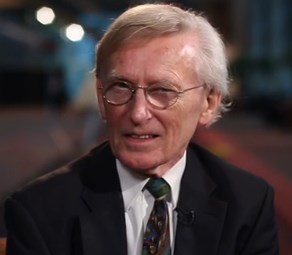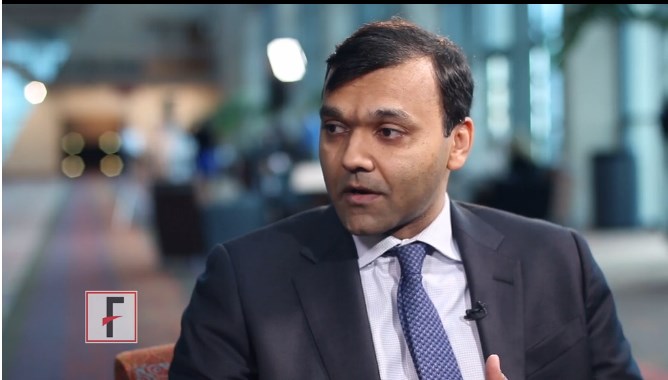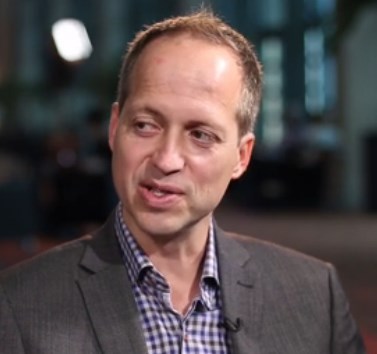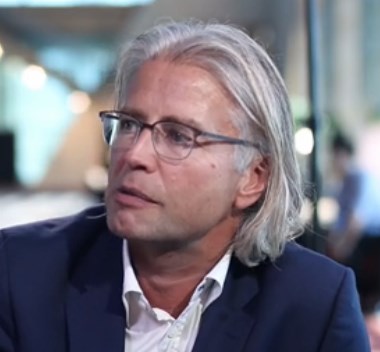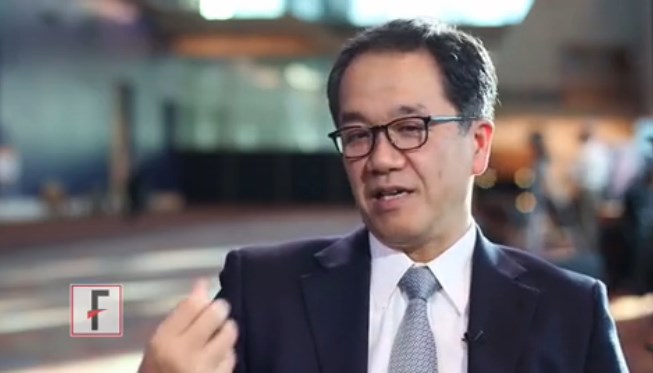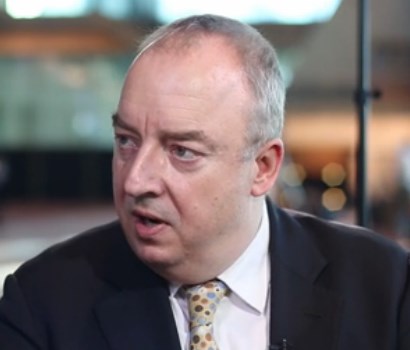User login
VIDEO: Is anastrozole or tamoxifen best for secondary prevention of DCIS?
SAN ANTONIO – Two large phase III randomized trials comparing anastrozole and tamoxifen for prevention of disease recurrence in postmenopausal women with ductal carcinoma in situ were presented at the San Antonio Breast Cancer Symposium.
In an interview, Dr. Anthony Howell, professor of medical oncology at the University of Manchester, England, provides the key take-home lessons from the NSABP B-35 and IBIS-II DCIS trials.
The video associated with this article is no longer available on this site. Please view all of our videos on the MDedge YouTube channel
SAN ANTONIO – Two large phase III randomized trials comparing anastrozole and tamoxifen for prevention of disease recurrence in postmenopausal women with ductal carcinoma in situ were presented at the San Antonio Breast Cancer Symposium.
In an interview, Dr. Anthony Howell, professor of medical oncology at the University of Manchester, England, provides the key take-home lessons from the NSABP B-35 and IBIS-II DCIS trials.
The video associated with this article is no longer available on this site. Please view all of our videos on the MDedge YouTube channel
SAN ANTONIO – Two large phase III randomized trials comparing anastrozole and tamoxifen for prevention of disease recurrence in postmenopausal women with ductal carcinoma in situ were presented at the San Antonio Breast Cancer Symposium.
In an interview, Dr. Anthony Howell, professor of medical oncology at the University of Manchester, England, provides the key take-home lessons from the NSABP B-35 and IBIS-II DCIS trials.
The video associated with this article is no longer available on this site. Please view all of our videos on the MDedge YouTube channel
AT SABCS 2015
VIDEO: Beta-blocker prevented trastuzumab-related drop in LVEF
SAN ANTONIO – Prophylactic beta-blockade with bisoprolol during adjuvant trastuzumab therapy for HER2-positive breast cancer prevented trastuzumab-induced decline in left ventricular ejection fraction in a randomized trial.
In an interview at the San Antonio Breast Cancer Symposium, Dr. Edie Pituskin of the University of Alberta, Edmonton, explained why the double-blind, placebo-controlled MANTICORE trial may change clinical practice.
The video associated with this article is no longer available on this site. Please view all of our videos on the MDedge YouTube channel
SAN ANTONIO – Prophylactic beta-blockade with bisoprolol during adjuvant trastuzumab therapy for HER2-positive breast cancer prevented trastuzumab-induced decline in left ventricular ejection fraction in a randomized trial.
In an interview at the San Antonio Breast Cancer Symposium, Dr. Edie Pituskin of the University of Alberta, Edmonton, explained why the double-blind, placebo-controlled MANTICORE trial may change clinical practice.
The video associated with this article is no longer available on this site. Please view all of our videos on the MDedge YouTube channel
SAN ANTONIO – Prophylactic beta-blockade with bisoprolol during adjuvant trastuzumab therapy for HER2-positive breast cancer prevented trastuzumab-induced decline in left ventricular ejection fraction in a randomized trial.
In an interview at the San Antonio Breast Cancer Symposium, Dr. Edie Pituskin of the University of Alberta, Edmonton, explained why the double-blind, placebo-controlled MANTICORE trial may change clinical practice.
The video associated with this article is no longer available on this site. Please view all of our videos on the MDedge YouTube channel
AT SABCS 2015
VIDEO: Estrogen receptor gene mutations linked to poorer survival
SAN ANTONIO – Mutations of the estrogen receptor 1 (ESR1) gene are more common than previously thought in women with advanced estrogen receptor–positive breast cancer and are associated with poorer survival. In an interview at the San Antonio Breast Cancer Symposium, Dr. Sarat Chandarlapaty of Memorial Sloan Kettering Cancer Center, New York, discusses a mutational analysis of cell-free DNA in blood samples from the BOLERO-2 trial and how the findings may help refine therapeutic strategies.
The video associated with this article is no longer available on this site. Please view all of our videos on the MDedge YouTube channel
SAN ANTONIO – Mutations of the estrogen receptor 1 (ESR1) gene are more common than previously thought in women with advanced estrogen receptor–positive breast cancer and are associated with poorer survival. In an interview at the San Antonio Breast Cancer Symposium, Dr. Sarat Chandarlapaty of Memorial Sloan Kettering Cancer Center, New York, discusses a mutational analysis of cell-free DNA in blood samples from the BOLERO-2 trial and how the findings may help refine therapeutic strategies.
The video associated with this article is no longer available on this site. Please view all of our videos on the MDedge YouTube channel
SAN ANTONIO – Mutations of the estrogen receptor 1 (ESR1) gene are more common than previously thought in women with advanced estrogen receptor–positive breast cancer and are associated with poorer survival. In an interview at the San Antonio Breast Cancer Symposium, Dr. Sarat Chandarlapaty of Memorial Sloan Kettering Cancer Center, New York, discusses a mutational analysis of cell-free DNA in blood samples from the BOLERO-2 trial and how the findings may help refine therapeutic strategies.
The video associated with this article is no longer available on this site. Please view all of our videos on the MDedge YouTube channel
AT SABCS 2015
VIDEO: Time to skip chemo for luminal A tumors?
SAN ANTONIO – Premenopausal women with luminal A tumors did not derive benefit from adjuvant cyclophosphamide-based chemotherapy.
In an interview, Dr. Torsten Nielsen, professor of pathology at the University of British Columbia in Vancouver, discusses the prospective-retrospective study and whether its findings will prompt patients with these tumors and their physicians to skip chemotherapy.
The video associated with this article is no longer available on this site. Please view all of our videos on the MDedge YouTube channel
SAN ANTONIO – Premenopausal women with luminal A tumors did not derive benefit from adjuvant cyclophosphamide-based chemotherapy.
In an interview, Dr. Torsten Nielsen, professor of pathology at the University of British Columbia in Vancouver, discusses the prospective-retrospective study and whether its findings will prompt patients with these tumors and their physicians to skip chemotherapy.
The video associated with this article is no longer available on this site. Please view all of our videos on the MDedge YouTube channel
SAN ANTONIO – Premenopausal women with luminal A tumors did not derive benefit from adjuvant cyclophosphamide-based chemotherapy.
In an interview, Dr. Torsten Nielsen, professor of pathology at the University of British Columbia in Vancouver, discusses the prospective-retrospective study and whether its findings will prompt patients with these tumors and their physicians to skip chemotherapy.
The video associated with this article is no longer available on this site. Please view all of our videos on the MDedge YouTube channel
AT SABCS 2015
VIDEO: APOBEC3B enzyme may limit tamoxifen efficacy
SAN ANTONIO – Patients with estrogen receptor–positive breast cancers who had up-regulation of the APOBEC3B enzyme – a DNA-mutating enzyme – had a shorter time to progression on tamoxifen. In addition, suppressing levels of the enzyme in a preclinical model reduced tamoxifen resistance. In an interview, Reuben Harris, Ph.D., professor in the department of biochemistry, molecular biology, and biophysics at the University of Minnesota, Minneapolis, discussed the study’s findings and what they mean for the conduct of clinical trials and for future research.
The video associated with this article is no longer available on this site. Please view all of our videos on the MDedge YouTube channel
SAN ANTONIO – Patients with estrogen receptor–positive breast cancers who had up-regulation of the APOBEC3B enzyme – a DNA-mutating enzyme – had a shorter time to progression on tamoxifen. In addition, suppressing levels of the enzyme in a preclinical model reduced tamoxifen resistance. In an interview, Reuben Harris, Ph.D., professor in the department of biochemistry, molecular biology, and biophysics at the University of Minnesota, Minneapolis, discussed the study’s findings and what they mean for the conduct of clinical trials and for future research.
The video associated with this article is no longer available on this site. Please view all of our videos on the MDedge YouTube channel
SAN ANTONIO – Patients with estrogen receptor–positive breast cancers who had up-regulation of the APOBEC3B enzyme – a DNA-mutating enzyme – had a shorter time to progression on tamoxifen. In addition, suppressing levels of the enzyme in a preclinical model reduced tamoxifen resistance. In an interview, Reuben Harris, Ph.D., professor in the department of biochemistry, molecular biology, and biophysics at the University of Minnesota, Minneapolis, discussed the study’s findings and what they mean for the conduct of clinical trials and for future research.
The video associated with this article is no longer available on this site. Please view all of our videos on the MDedge YouTube channel
AT SABCS 2015
VIDEO: Mastectomy plus reconstruction has highest complication rates of all early BC treatment options
SAN ANTONIO – Mastectomy with reconstruction is the outlier in terms of complication rates and cost among options for local therapy for early breast cancer, according to a large observational study presented at the San Antonio Breast Cancer Symposium.
Complication rates during the first 2 years after diagnosis were roughly twice as high for mastectomy plus reconstruction, compared with lumpectomy with whole breast irradiation. Moreover, average total procedural and complication costs were $23,000 greater for women aged 65 years or younger who opted for mastectomy plus reconstruction than for those who chose lumpectomy plus whole breast irradiation. These fresh insights into the trade-offs involved in local treatment options should prove useful in oncologists’ discussions with newly diagnosed patients, as well as for payers, as Dr. Benjamin D. Smith of University of Texas M.D. Anderson Cancer Center, Houston, explains in an interview.
The video associated with this article is no longer available on this site. Please view all of our videos on the MDedge YouTube channel
SAN ANTONIO – Mastectomy with reconstruction is the outlier in terms of complication rates and cost among options for local therapy for early breast cancer, according to a large observational study presented at the San Antonio Breast Cancer Symposium.
Complication rates during the first 2 years after diagnosis were roughly twice as high for mastectomy plus reconstruction, compared with lumpectomy with whole breast irradiation. Moreover, average total procedural and complication costs were $23,000 greater for women aged 65 years or younger who opted for mastectomy plus reconstruction than for those who chose lumpectomy plus whole breast irradiation. These fresh insights into the trade-offs involved in local treatment options should prove useful in oncologists’ discussions with newly diagnosed patients, as well as for payers, as Dr. Benjamin D. Smith of University of Texas M.D. Anderson Cancer Center, Houston, explains in an interview.
The video associated with this article is no longer available on this site. Please view all of our videos on the MDedge YouTube channel
SAN ANTONIO – Mastectomy with reconstruction is the outlier in terms of complication rates and cost among options for local therapy for early breast cancer, according to a large observational study presented at the San Antonio Breast Cancer Symposium.
Complication rates during the first 2 years after diagnosis were roughly twice as high for mastectomy plus reconstruction, compared with lumpectomy with whole breast irradiation. Moreover, average total procedural and complication costs were $23,000 greater for women aged 65 years or younger who opted for mastectomy plus reconstruction than for those who chose lumpectomy plus whole breast irradiation. These fresh insights into the trade-offs involved in local treatment options should prove useful in oncologists’ discussions with newly diagnosed patients, as well as for payers, as Dr. Benjamin D. Smith of University of Texas M.D. Anderson Cancer Center, Houston, explains in an interview.
The video associated with this article is no longer available on this site. Please view all of our videos on the MDedge YouTube channel
AT SABCS 2015
VIDEO: Triple-negative breast cancer outcomes boosted by adding carboplatin to neoadjuvant chemo
SAN ANTONIO – Adding weekly carboplatin to 18 weeks of anthracycline/taxane-based neoadjuvant chemotherapy markedly improved disease-free survival in patients with triple-negative breast cancer, according to updated results from the GeparSixto trial presented at the San Antonio Breast Cancer Symposium.
Dr. Gunter von Minckwitz, president of the German Breast Group, explains in an interview that the nearly 50% reduction in the risk of disease relapse at 3 years seen in the phase II trial has converted him and his coinvestigators to routine use of add-on carboplatin in triple-negative breast cancer patients on neoadjuvant chemotherapy.
The video associated with this article is no longer available on this site. Please view all of our videos on the MDedge YouTube channel
SAN ANTONIO – Adding weekly carboplatin to 18 weeks of anthracycline/taxane-based neoadjuvant chemotherapy markedly improved disease-free survival in patients with triple-negative breast cancer, according to updated results from the GeparSixto trial presented at the San Antonio Breast Cancer Symposium.
Dr. Gunter von Minckwitz, president of the German Breast Group, explains in an interview that the nearly 50% reduction in the risk of disease relapse at 3 years seen in the phase II trial has converted him and his coinvestigators to routine use of add-on carboplatin in triple-negative breast cancer patients on neoadjuvant chemotherapy.
The video associated with this article is no longer available on this site. Please view all of our videos on the MDedge YouTube channel
SAN ANTONIO – Adding weekly carboplatin to 18 weeks of anthracycline/taxane-based neoadjuvant chemotherapy markedly improved disease-free survival in patients with triple-negative breast cancer, according to updated results from the GeparSixto trial presented at the San Antonio Breast Cancer Symposium.
Dr. Gunter von Minckwitz, president of the German Breast Group, explains in an interview that the nearly 50% reduction in the risk of disease relapse at 3 years seen in the phase II trial has converted him and his coinvestigators to routine use of add-on carboplatin in triple-negative breast cancer patients on neoadjuvant chemotherapy.
The video associated with this article is no longer available on this site. Please view all of our videos on the MDedge YouTube channel
AT SABCS 2015
VIDEO: Adjuvant capecitabine has role for residual disease after neoadjuvant therapy
SAN ANTONIO – Adjuvant capecitabine improved both disease-free and overall survival in women with HER2-negative breast cancer who had residual disease after neoadjuvant chemotherapy. In an interview, Dr. Masakazu Toi, a professor at Kyoto University Hospital, and founder and senior director of the Japan Breast Cancer Research Group, discusses the phase III CREATE-X trial and its implications for clinical care.
The video associated with this article is no longer available on this site. Please view all of our videos on the MDedge YouTube channel
SAN ANTONIO – Adjuvant capecitabine improved both disease-free and overall survival in women with HER2-negative breast cancer who had residual disease after neoadjuvant chemotherapy. In an interview, Dr. Masakazu Toi, a professor at Kyoto University Hospital, and founder and senior director of the Japan Breast Cancer Research Group, discusses the phase III CREATE-X trial and its implications for clinical care.
The video associated with this article is no longer available on this site. Please view all of our videos on the MDedge YouTube channel
SAN ANTONIO – Adjuvant capecitabine improved both disease-free and overall survival in women with HER2-negative breast cancer who had residual disease after neoadjuvant chemotherapy. In an interview, Dr. Masakazu Toi, a professor at Kyoto University Hospital, and founder and senior director of the Japan Breast Cancer Research Group, discusses the phase III CREATE-X trial and its implications for clinical care.
The video associated with this article is no longer available on this site. Please view all of our videos on the MDedge YouTube channel
AT SABCS 2015
Delayed Adjuvant Chemotherapy Significantly Affects Breast Cancer Recovery
In an observational, population-based, investigational study published in JAMA online, researchers from University of Texas MD Anderson Cancer Center in Houston and the Cancer Prevention Institute of California in Fremont hypothesized that prolonged time to chemotherapy (TTC) would be associated with adverse outcomes. Data from the California Cancer Registry were used to study 24,843 patients with stage I to stage III invasive breast cancer who were diagnosed between January 1, 2005, and December 31, 2010.
The use of adjuvant chemotherapy has had a significant effect in decreasing the risk of reoccurrence and in improving survival rates among patients with early-stage breast cancer, said the researchers. Delaying adjuvant chemotherapy beyond the typical start of 30 to 40 days of surgery could decrease the benefits provided by cytotoxic systemic therapies.
Related: Extending Therapy for Breast Cancer
Researchers gathered patient information, including demographic characteristics (age, race, marital status, insurance type), other variables related to the cancer diagnosis and treatment, and data on patient’s tumor estrogen receptor, progesterone receptor, and human epidermal growth factor receptor 2 (ERBB2) status. The participants were categorized into subgroups according to breast cancer subtype and TTC categories of ≤ 30 days, 31 to 60 days, 61 to 90 days, or ≥ 90 days. Ninety-one or more days from surgery to the first diagnosis of adjuvant chemotherapy was considered a delay.
After evaluating all the factors associated with a delay in adjuvant chemotherapy administration, the researchers observed that compared with stage I patients those with stage II and stage III were less likely to have delays in chemotherapy administration. It was also found that patients with triple-negative breast cancer (TNBC) were less likely to have delays compared with patients with hormone-receptor positive tumors. Other factors associated with delays in TTC included low socioeconomic status (SES), breast reconstruction, nonprivate insurance, and ethnicity.
Related: Gene Expression Signatures in Breast Cancer: A Surgical Oncologist’s Perspective
Data from the analysis also showed that patients who received chemotherapy ≥ 91 days after surgery had worse overall survival (OS) along with patients with hormone-receptor positive and TNBC who were treated within the same time frame. Older age, advanced-stage breast cancer, ethnicity, lower SES, and type of insurance coverage also contributed to worse OS.
Related: Advances in Targeted Therapy for Breast Cancer
As a result of the analysis, the researchers suggest all breast cancer patients who are candidates for adjuvant chemotherapy should receive treatment within 9 days of surgery or 120 days from diagnosis. Better understanding and removing socioeconomic barriers to access of care should also be a priority for health care providers.
Source: Chavez-MacGregor M, Clarke CA, Lichtensztajin DY, et al. Delayed initiation of adjuvant chemotherapy among patients with breast cancer. JAMA Oncol. 2015; doi: 10.10 01/jamaoncol. 2015.3856 [Published online December 10, 2015].
In an observational, population-based, investigational study published in JAMA online, researchers from University of Texas MD Anderson Cancer Center in Houston and the Cancer Prevention Institute of California in Fremont hypothesized that prolonged time to chemotherapy (TTC) would be associated with adverse outcomes. Data from the California Cancer Registry were used to study 24,843 patients with stage I to stage III invasive breast cancer who were diagnosed between January 1, 2005, and December 31, 2010.
The use of adjuvant chemotherapy has had a significant effect in decreasing the risk of reoccurrence and in improving survival rates among patients with early-stage breast cancer, said the researchers. Delaying adjuvant chemotherapy beyond the typical start of 30 to 40 days of surgery could decrease the benefits provided by cytotoxic systemic therapies.
Related: Extending Therapy for Breast Cancer
Researchers gathered patient information, including demographic characteristics (age, race, marital status, insurance type), other variables related to the cancer diagnosis and treatment, and data on patient’s tumor estrogen receptor, progesterone receptor, and human epidermal growth factor receptor 2 (ERBB2) status. The participants were categorized into subgroups according to breast cancer subtype and TTC categories of ≤ 30 days, 31 to 60 days, 61 to 90 days, or ≥ 90 days. Ninety-one or more days from surgery to the first diagnosis of adjuvant chemotherapy was considered a delay.
After evaluating all the factors associated with a delay in adjuvant chemotherapy administration, the researchers observed that compared with stage I patients those with stage II and stage III were less likely to have delays in chemotherapy administration. It was also found that patients with triple-negative breast cancer (TNBC) were less likely to have delays compared with patients with hormone-receptor positive tumors. Other factors associated with delays in TTC included low socioeconomic status (SES), breast reconstruction, nonprivate insurance, and ethnicity.
Related: Gene Expression Signatures in Breast Cancer: A Surgical Oncologist’s Perspective
Data from the analysis also showed that patients who received chemotherapy ≥ 91 days after surgery had worse overall survival (OS) along with patients with hormone-receptor positive and TNBC who were treated within the same time frame. Older age, advanced-stage breast cancer, ethnicity, lower SES, and type of insurance coverage also contributed to worse OS.
Related: Advances in Targeted Therapy for Breast Cancer
As a result of the analysis, the researchers suggest all breast cancer patients who are candidates for adjuvant chemotherapy should receive treatment within 9 days of surgery or 120 days from diagnosis. Better understanding and removing socioeconomic barriers to access of care should also be a priority for health care providers.
Source: Chavez-MacGregor M, Clarke CA, Lichtensztajin DY, et al. Delayed initiation of adjuvant chemotherapy among patients with breast cancer. JAMA Oncol. 2015; doi: 10.10 01/jamaoncol. 2015.3856 [Published online December 10, 2015].
In an observational, population-based, investigational study published in JAMA online, researchers from University of Texas MD Anderson Cancer Center in Houston and the Cancer Prevention Institute of California in Fremont hypothesized that prolonged time to chemotherapy (TTC) would be associated with adverse outcomes. Data from the California Cancer Registry were used to study 24,843 patients with stage I to stage III invasive breast cancer who were diagnosed between January 1, 2005, and December 31, 2010.
The use of adjuvant chemotherapy has had a significant effect in decreasing the risk of reoccurrence and in improving survival rates among patients with early-stage breast cancer, said the researchers. Delaying adjuvant chemotherapy beyond the typical start of 30 to 40 days of surgery could decrease the benefits provided by cytotoxic systemic therapies.
Related: Extending Therapy for Breast Cancer
Researchers gathered patient information, including demographic characteristics (age, race, marital status, insurance type), other variables related to the cancer diagnosis and treatment, and data on patient’s tumor estrogen receptor, progesterone receptor, and human epidermal growth factor receptor 2 (ERBB2) status. The participants were categorized into subgroups according to breast cancer subtype and TTC categories of ≤ 30 days, 31 to 60 days, 61 to 90 days, or ≥ 90 days. Ninety-one or more days from surgery to the first diagnosis of adjuvant chemotherapy was considered a delay.
After evaluating all the factors associated with a delay in adjuvant chemotherapy administration, the researchers observed that compared with stage I patients those with stage II and stage III were less likely to have delays in chemotherapy administration. It was also found that patients with triple-negative breast cancer (TNBC) were less likely to have delays compared with patients with hormone-receptor positive tumors. Other factors associated with delays in TTC included low socioeconomic status (SES), breast reconstruction, nonprivate insurance, and ethnicity.
Related: Gene Expression Signatures in Breast Cancer: A Surgical Oncologist’s Perspective
Data from the analysis also showed that patients who received chemotherapy ≥ 91 days after surgery had worse overall survival (OS) along with patients with hormone-receptor positive and TNBC who were treated within the same time frame. Older age, advanced-stage breast cancer, ethnicity, lower SES, and type of insurance coverage also contributed to worse OS.
Related: Advances in Targeted Therapy for Breast Cancer
As a result of the analysis, the researchers suggest all breast cancer patients who are candidates for adjuvant chemotherapy should receive treatment within 9 days of surgery or 120 days from diagnosis. Better understanding and removing socioeconomic barriers to access of care should also be a priority for health care providers.
Source: Chavez-MacGregor M, Clarke CA, Lichtensztajin DY, et al. Delayed initiation of adjuvant chemotherapy among patients with breast cancer. JAMA Oncol. 2015; doi: 10.10 01/jamaoncol. 2015.3856 [Published online December 10, 2015].
VIDEO: Win-win with denosumab as adjuvant therapy for post-menopausal breast cancer
SAN ANTONIO – Adding denosumab to adjuvant aromatase inhibitor therapy, not only reduced risk of fracture, but also improved disease-free survival for postmenopausal patients with early-stage, hormone receptor–positive breast cancer, according to results presented at the San Antonio Breast Cancer Symposium.
In an interview, Dr. Michael Gnant, professor of surgery at the Medical University of Vienna, discusses the phase III ABCSG-18 clinical trial, and why he will now be prescribing denosumab to HR-positive breast cancer patients who are receiving adjuvant aromatase inhibitor therapy, regardless of their bone health status.
The video associated with this article is no longer available on this site. Please view all of our videos on the MDedge YouTube channel
SAN ANTONIO – Adding denosumab to adjuvant aromatase inhibitor therapy, not only reduced risk of fracture, but also improved disease-free survival for postmenopausal patients with early-stage, hormone receptor–positive breast cancer, according to results presented at the San Antonio Breast Cancer Symposium.
In an interview, Dr. Michael Gnant, professor of surgery at the Medical University of Vienna, discusses the phase III ABCSG-18 clinical trial, and why he will now be prescribing denosumab to HR-positive breast cancer patients who are receiving adjuvant aromatase inhibitor therapy, regardless of their bone health status.
The video associated with this article is no longer available on this site. Please view all of our videos on the MDedge YouTube channel
SAN ANTONIO – Adding denosumab to adjuvant aromatase inhibitor therapy, not only reduced risk of fracture, but also improved disease-free survival for postmenopausal patients with early-stage, hormone receptor–positive breast cancer, according to results presented at the San Antonio Breast Cancer Symposium.
In an interview, Dr. Michael Gnant, professor of surgery at the Medical University of Vienna, discusses the phase III ABCSG-18 clinical trial, and why he will now be prescribing denosumab to HR-positive breast cancer patients who are receiving adjuvant aromatase inhibitor therapy, regardless of their bone health status.
The video associated with this article is no longer available on this site. Please view all of our videos on the MDedge YouTube channel
AT SABCS 2015
